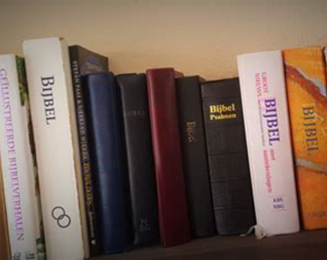NBV21 seeks a substitute for ‘flesh’
14-07-2025 - Posted by Geert-JanOriginally posted on May 19, 2021 by Andre Piet
The Dutch Bible Society is currently working on a revision of the Dutch Bible Translation: the NBV21. Today, news surfaced that the translators were struggling with the word “flesh” as the translation of the Greek word sarx. This Greek word appears 147 times in the New Testament, and even the Dutch NBG51 translation at the time rendered it almost exclusively as “flesh”. So a fairly concordant choice. And rightly so. Concordant means: to choose, as much as possible, consistent translation words.
anti-physical?
According to the NBV21 translators, however, the rendering “flesh” was no longer adequate, as it would suggest an anti-physical attitude in many passages. For example, in Romans 7:18 where Paul writes: “For I know that in me, that is, in my flesh, no good is dwelling…”. But is this an anti-physical statement? Or is Paul simply stating that weak flesh is not good—that is, not able to overcome sin? And secondly: does the misunderstanding of the superficial reader justify changing a correct translation word? Can we not expect some effort from the Bible reader? Whoever wants to reach the source must be willing to swim against the current.
Moreover, the word “flesh” is also used in a very positive sense in the New Testament. Also by Paul. For example, in Ephesians 5:29 he writes: “no one ever hates his own flesh…”. And in John 1:14 we read: “… and the Word became flesh…”. How is that “anti-physical”?
earthly?
The NBV21 translators have chosen to render the Greek sarx in various passages of Paul’s letters as “earthly”. The point, however, is that “earthly” in Greek is a different word (epi-geios), which occurs about twelve times in the NT. So what do we do with those? Are flesh and earthly the same? Besides, if flesh gives such an anti-physical impression in some passages, does earthly then not evoke an anti-earthly one? Is that what they want? As you can see, the substitute for “flesh” is merely a shift of the problem. That is, if there even is a problem to begin with.
concordant
I do realize that concordant translation can be difficult and sometimes even impossible. The idiom of two languages can differ so much that one is forced to deviate from the concordant principle. But then why not explain such deviations in a footnote? As the Telos translation, for example, has done. Or in marginal notes, like the translators of the Statenvertaling used. That would at least be honest. Both toward the original text and toward the reader.
And an even better alternative: provide an interlinear word-for-word rendering as standard alongside a Bible translation (see ISA, Interlinear Scripture Analyzer from scripture4all). With such a transparent approach, you bring people as close as possible to the facts of the Word itself. Is that not far preferable to burdening the Bible reader with subjective opinions of translators and inevitable arbitrariness? The NBV was already a sad example of that approach, and the NBV21 goes even further. Once the path of discordant translation is taken, the Bible reader is by definition delivered over to the opinions of translators and the spirit of the times. One only stays on course when reverence for the Scripture and its Author prevails over the convenience of the Bible reader.

 English Blog
English Blog